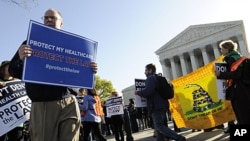President Barack Obama’s signature health care law appeared to be in legal jeopardy Tuesday, following oral arguments before the Supreme Court of the United States over whether the law is constitutional. The case now before the high court represents a major legal and political showdown over health care reform that the president signed into law two years ago despite strong objections from opposition Republicans.
Related video by Carolyn Presutti
In the second of three days of oral arguments before the Supreme Court, the nine justices considered a key part of the health care law known as the individual mandate.
The mandate requires all Americans to buy health insurance, beginning in 2014 or face a penalty. Supporters say the mandate is necessary to spread the costs of covering millions of previously uninsured citizens. Opponents regard the mandate an unconstitutional overreach by the federal government.
During Tuesday’s oral arguments, conservative-leaning justices on the high court seemed skeptical that the individual mandate should be allowed under the U.S. Constitution.
Justice Antonin Scalia is one of the high court’s leading conservative thinkers.
“The federal government is not supposed to be a government that has all powers, that it is supposed to be a government of limited powers and that is what all this questioning is about," he said. "What is left? If the government can do this, what else can it not do?”
Scalia is one of four justices on the nine-member court who consistently take conservative positions.
Four other justices, all appointed by Democratic presidents, have a more liberal voting record. They generally were more open to the idea that the health care law is constitutional.
Among them is Justice Stephen Breyer.
“It shows there is a national problem and it shows there is a national problem that involves money, cost and insurance,” said Breyer.
The key vote in many Supreme Court cases is often cast by Justice Anthony Kennedy, who often is referred to as the "swing justice" by legal experts who follow the Supreme Court.
Kennedy also seemed skeptical about the power of Congress to compel everyone to buy health insurance.
“When you are changing the relation of the individual to the government in this what we can stipulate is, I think, a unique way, do you not have a heavy burden of justification to show authorization under the Constitution?” he said.
As the oral arguments continued before the high court, demonstrators on both sides of the issue marched outside the court for a second day.
The case is being closely watched by members of Congress. Senator Marco Rubio, a Republican from Florida, is among those hoping that the high court will strike down the Obama health care law.
“We are hopeful that the Supreme Court will see it the way we do and that this law violates simple and basic constitutional principles,” said Rubio.
Democratic Senator Tom Harkin of Iowa says millions of Americans in need of health insurance will lose out if the health care law is struck down.
“Whether or not we are going to let the Republicans take away from the American people all of these hard-earned, hard-won gains in their own health care system,” said Harkin.
The health care law has been controversial from the beginning. The law passed Congress two years ago, supported only by Democrats. And public opinion surveys show the country remains sharply divided over the issue.
The Supreme Court is expected to issue a ruling on the constitutionality of the health care law sometime before the end of June, and many experts say the decision will have an impact on this year’s presidential and congressional elections.








